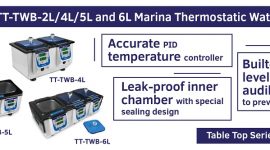28 Aug
2018
Choosing the Right Centrifuge for Your Lab
There are various types of centrifuge in the market and it may seem confusing with all kinds of specifications, shapes and sizes. Here we list some crucial factors you should be considering when selecting the ideal centrifuge for your lab.
- What kind of sample are you working with?
Some centrifuges are designed for specific functions and knowing which centrifuge allows your lab applications is one of the major factors of consideration. For example, a molecular biology lab would likely require high-speed benchtop centrifuge with pre-cool functions. As you are working with DNA, RNA and protein, this function is important to prevent any sample degradation. For cell culture labs, a low speed centrifuge is often preferred to maintain cell viability especially delicate mammalian cells. If you are working with PCR plates, consider getting centrifuges that are specifically fitted with PCR plate holders. - What are the maximum and minimum g-force (relative centrifugal force, RCF) and volume requirements?
This is perhaps one of the most important, if not the main aspect of specifications that requires special attention. Depending on the sample you are working with, they need different g-force. Applications such as DNA, RNA and miniprep kits usually requires about 21,000 ×g. For cell harvesting, centrifuge with up to approximately 7000 ×g is sufficient. Take note of the sample volumes you are working in, whether they are in microtubes or require larger conical tubes. These would affect your choice of rotors. - Do you need biocontainment?
Are you working with dangerous and high-risk samples such as polio virus or Ebola? If yes, biocontainment is ideal as safety requirement and to prevent any contamination. - Are the rotors autoclavable?
To avoid contamination between samples, it is recommended to have routine maintenance of your rotors. This includes cleaning and autoclaving the rotors for sterilization purpose. - What is the available space in your lab?
Some labs may have limited space. Therefore, a compact benchtop centrifuge may be more suitable than a large floor standing type. Ultimately, it still boils down to the type of application and your available options for those applications.
- What kind of sample are you working with?






